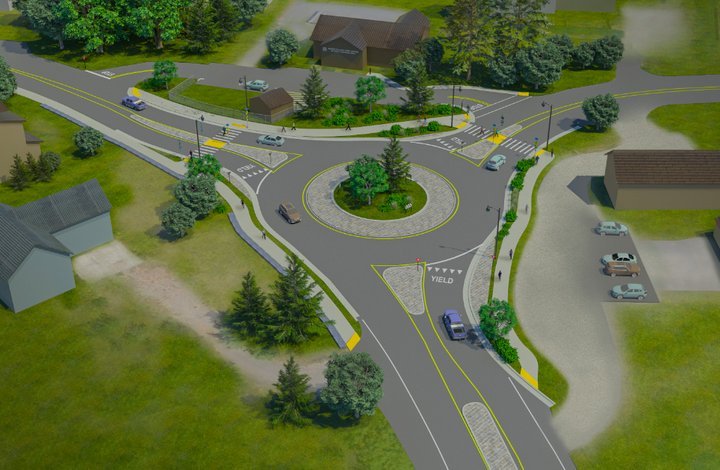
Rendering of the roundabout planned for Old Arcata Road and Jacoby Creek Road.
###
PREVIOUSLY:
- Arcata City Council to Discuss Long-Planned Safety Improvements for Old Arcata Road; Project Construction Expected to Start in 2022
- OLD ARCATA ROUNDABOUT? Arcata Council to Consider Improvement Plans for Old Arcata Road, But Some Bayside Residents Aren’t Happy With the Design
###
The Arcata City Council was all set to make a decision Wednesday night on the fate of the Old Arcata Road Improvement Project, which calls for a variety of upgrades to the busy thoroughfare including a roundabout at the intersection of Old Arcata Road and Jacoby Creek Road.
But thanks to a last-minute letter from a small group of roundabout opponents known as Bayside Cares, the city must now embark on a roundabout of its own — recirculating portions of the project’s environmental impact report (EIR) for another 45-day comment period.
Arcata Community Development Director David Loya somewhat sheepishly explained the situation via teleconference video last night, saying at one point, “I realize this is going to be a disappointment to many in the community who’ve expressed support for the project.”
City staff, he said, had received communication earlier in the day from representatives of Bayside Cares. They sent along a letter from a local wetland scientist who pointed out that the project would lead to potentially significant impacts to wetlands. The wetlands in question are not high quality, Loya said. In fact, they’re the ditches that line Jacoby Creek Road near the project site. But still, they’re technically wetlands, and the project calls for portions of the ditches to be filled and culverted near the project site.
Staff had previously identified these anticipated impacts to wetlands, documenting them in the city’s Mitigate Negative Declaration (MND), an environmental review document that says all anticipated environmental impacts can be reduced to less-than-significant levels via mitigation measures. In this case, to mitigate the wetland loss, Arcata staff proposed setting aside land to create new wetlands.
However, in preparing the Draft Environmental Impact Report (DEIR), staff evidently misunderstood a finding from local engineering consultants at GHD. The DEIR wound up saying there would be no wetland impacts, which is not the case.
“We verified that in fact those impacts are happening,” Loya said, adding that he appreciates the participation of members of Bayside Cares as well as “others who have put so much into this EIR.”
The city will now recirculate the relevant portions of the environmental document, allowing 45 days for agencies and the public to submit another round of feedback. Loya said staff believes they can bring the matter back to the board for a decision sometime in February.
CLICK TO MANAGE